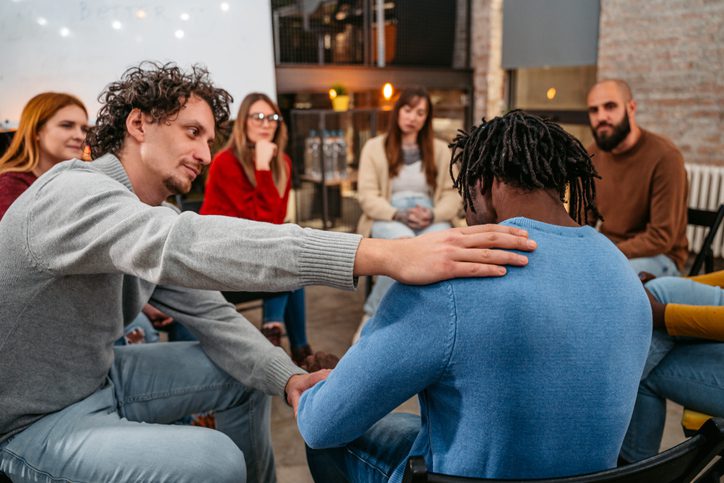The majority of addiction rehabilitation facilities, including Great Oaks Recovery Center, have a 12-step peer support group component of treatment to extend encouragement, provide structure and accountability, and host an environment of shared success. However, as you move through your new life of sobriety, it’s also important to choose the right recovery program for you—whether it’s rooted in a 12-step philosophy or offers another approach—to help you stick to your intentions and reinforce connection to a sober community. We’ve compiled an extensive list of mutual aid groups that might cater to your personal preferences and needs.
Why Do Support Groups Matter?
When a person struggles with substance use disorder (SUD), alcohol use disorder (AUD), and mood disorders, there’s a tendency to sink into isolation. It’s also sometimes challenging to find people who truly understand what’s happened in your past, what you’re focusing on in the present, and how you’re building a new future.
Many studies reinforce the multiple benefits of peer-based recovery programs, especially when someone is an active participant, learning and growing as much as they can in a supportive environment. And that’s really an essential point: when you discover the right group that recognizes and encourages your goals, it’s much easier to maintain sobriety.
Different Types of 12-Step Recovery Programs
Most of us are familiar with Alcoholics Anonymous (AA), started in 1935, and Narcotics Anonymous (NA), founded in 1953. Over time, additional support groups have emerged, dedicated to other types of disorders and diseases, incorporating the basic 12-Step approach established by these two organizations but designed to provide support for more specific issues. Let’s take a closer look.
- Adult Children of Alcoholics/Dysfunctional Families: Since 1987, ACA reinforces 12-Step tenets to foster healing from historical family and addiction trauma.
- Al-Anon Family Groups: Formally a subset of AA, this program helps teenagers, families, and friends of people with AUD address the impact of their loved one’s addiction.
- Cocaine Anonymous: Founded in 1982, this nonprofit isn’t affiliated with AA but adapted many principles of the 12-Step philosophy.
- Crystal Meth Anonymous: Founder Bill C. created CMA in 1994 to use the 12 Steps and Traditions to support people recovering from methamphetamine addiction.
- Dual Diagnosis Anonymous: Created in 1996, this group helps attendees with dual diagnoses find balance managing addiction recovery and mental health issues.
- Heroin Anonymous: Co-founders Paul F. and Mike S. both used AA in their recovery from heroin addiction but founded HA in 2004, believing it was necessary to focus on the particular challenges and recovery from this drug.
- Marijuana Anonymous: Started in 1989, this organization helps individuals recognize the potential for marijuana addiction and the benefits of 12-Step support to recover from it.
- Nar-Anon Family Groups: Similar to Al-Anon, this program began in 1971 to assist family and friends of individuals with different types of SUD.
- Yoga and 12-Step Recovery. Founder Nikki Meyer, also in recovery, created this program in 2004 to combine yoga wisdom, 12-Step guidelines, and trauma-informed healing education.
Other support programs with similar 12-Step approaches address process addictions and other issues. They include:
- Co-Dependents Anonymous
- Co-Sex Addicts Anonymous
- Debtors Anonymous
- Depressed Anonymous
- Dual Recovery Anonymous
- Emotions Anonymous
- Gamblers Anonymous
- Overeaters Anonymous
- Workaholics Anonymous
You’ll find comprehensive websites for each program, detailed descriptions of their mission, and reasons why they may be just what you’re looking for to further wellness.
Additional Recovery Program Options
Maybe the 12-Step process doesn’t align with your beliefs and individual goals. Or perhaps you’d like to supplement what you learn at these meetings with a different perspective. These other types of mutual aid support groups still provide guidance to make the most of your sober living direction.
- Anxiety & Depression Association Peer to Peer Groups
- LifeRing Secular Recovery
- Moderation Management
- Secular Organizations for Sobriety (S.O.S.)
- Self-Management and Recovery Training (SMART) Recovery
- Women for Sobriety
Research these alternatives to see how they can help define your goals. Also ask for additional resources from continuing care community groups affiliated with your rehab center.
Start the Recovery Process at Great Oaks
There are many contributing factors to SUD and AUD, and unfortunately, the one drawback to group recovery programs is they’re not actually treatment. At Great Oaks Recovery Center outside of Houston, we strive to provide dedicated whole-person care that establishes a foundation of wellness. Our team offers numerous resources that create a gateway to a sober network that reinforces what you’ve learned through individualized care and specialized therapy. Once you untangle the reasons for addiction, you’ll feel more confident knowing that you don’t have to walk a sobriety journey alone.



